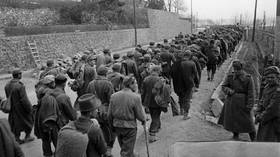‘Heroes’: Budapest lauds Hungarians who allied with Nazis to invade USSR

The official Facebook page of the Hungarian government has called its soldiers, who were killed in the Soviet Union while assisting Nazi Germany’s invasion of the country, “heroes who fought for Hungary.”
The mind-boggling statement is meant to commemorate the Hungarian casualties of the so-called Ostrogozhsk–Rossosh offensive, an operation of the Red Army in what is now southeastern Ukraine, which was launched in January 1943. During the campaign, the Soviets defeated Hungarian and Italian troops that were allied with Nazi Germany, with an estimated 50,000 killed and 70,000 taken prisoner over the course of 15 days.
According to the statement by the Hungarian government, however, Hitler’s allies that invaded the USSR “fought for Hungary at the Don River,” and should be respected as heroes. How exactly taking part in a war of aggression amounts to fighting for one’s homeland was not explained, however.
Also on rt.com Now it’s official: Ukraine marks birthday of Nazi collaborator Stepan Bandera (PHOTOS)Hungary, which became a highly nationalistic expansionist state and had close ties with Germany and Italy in the 1930s, became a formal member of the Axis powers in 1940. Budapest provided troops for the Germany-backed occupation of Yugoslavia, and later participated in the German invasion of the USSR, joining the offensive a week after it started.
The crushing defeat on the Don River became the largest-scale military disaster in Hungary’s history, and prompted the country to seek a separate armistice with the Allied powers. This led to Germany occupying Hungary in March 1944 but, months later, Hungary itself became a battlefield as the Red Army and its allies from countries like Poland, Romania and Czechoslovakia went in.
Also on rt.com Secret Nazi symbol appears on logo of German far-right party set up by ex-AfD chiefAfter the war, Hungary convicted over 25,000 people for crimes committed during the war, around 200 of whom were executed. Gusztav Jany, the commander of the Hungarian troops during the Ostrogozhsk–Rossosh offensive, whose defeat by the Soviets didn’t stop Nazi Germany from decorating him with the Knight’s Cross of the Iron Cross, was among them. He was posthumously exonerated by Budapest in 1993.
Like this story? Share it with a friend!














